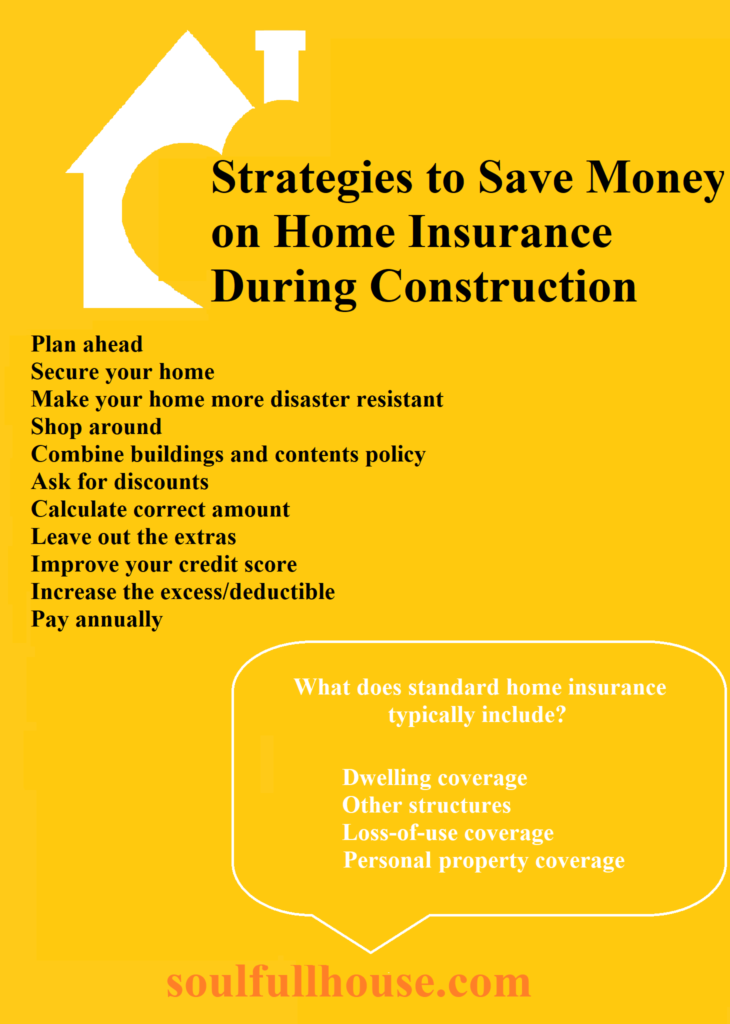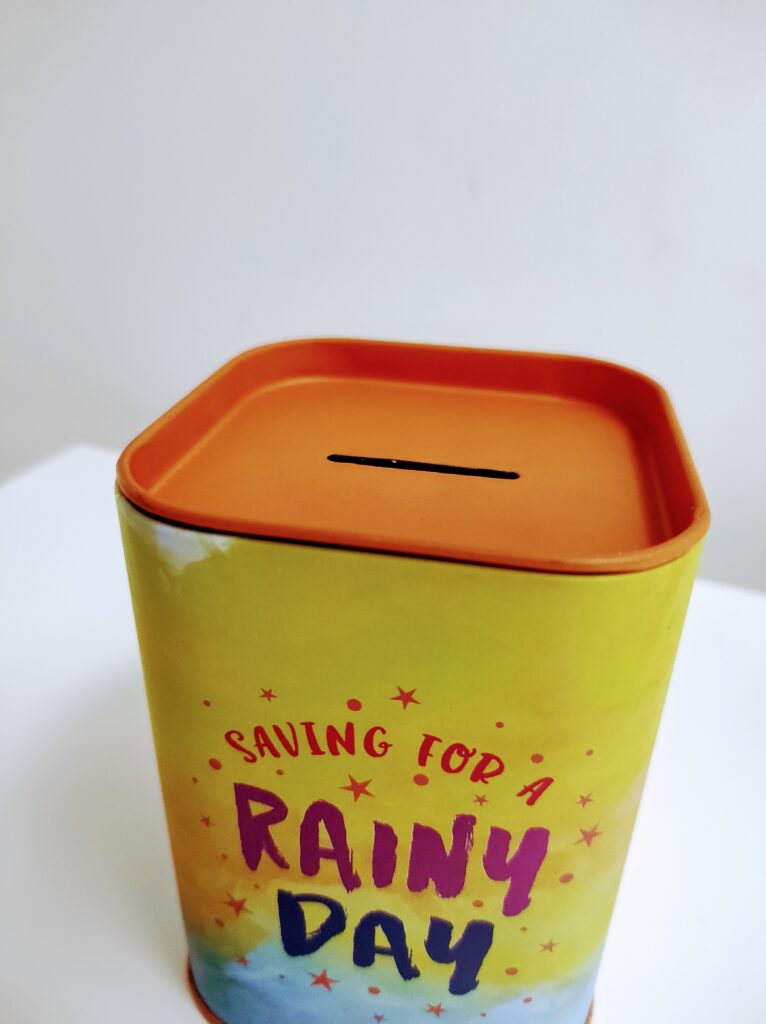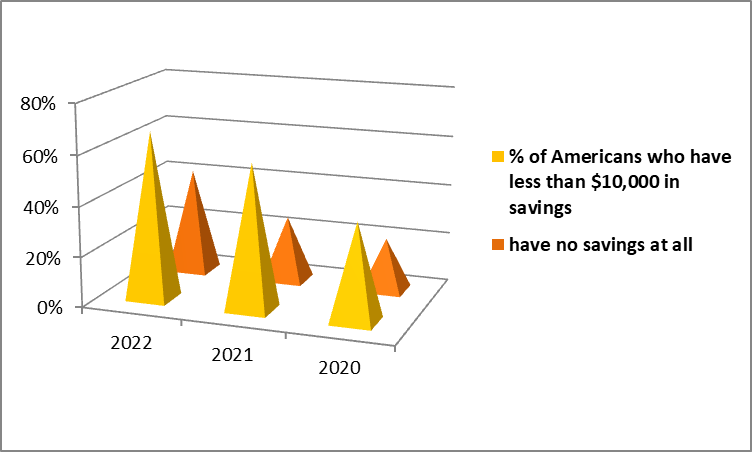It is not necessary to waste many words to emphasize the importance of home insurance as a guarantee of the future of you and your family. On the other hand, this represents a significant budget item, particularly in light of global economic trends in 2023 and future prospects. The cost of homeowners insurance can vary by hundreds of dollars based on the size, location, and overall quality of your home, as well as the insurance company. Therefore, if you’ve started or plan to start building your own house in the near future, let’s look at what you can do and how you may save as much money as possible.

What does standard home insurance typically include?
- Standard home insurance typically includes four parts:
- Dwelling coverage
- Other structures
- Loss-of-use coverage
- Personal property coverage

How to save money on home insurance during construction?
As a general rule, we can say that saving money on home insurance during construction may be accomplished by enhancing its safety and resistance, as well as by implementing all of the usual methods that save money on home insurance. There are eleven strategies for lowering house insurance costs:
- Plan ahead
- Secure your home
- Make your home more disaster resistant
- Shop around
- Combine buildings and contents policy
- Ask for discounts
- Calculate correct amount
- Leave out the extras
- Improve your credit score
- Increase the excess/deductible
- Pay annually
Let’s start with strategies related to the house-building process itself.
1. Plan ahead!
The best way to save money on your homeowner’s policy is to take into account the cost of insurance while you’re looking for a lot and designing a house. Home insurance guidelines provide tips on the locations, types of construction and other factors that will help keep down the cost of your coverage. Based on this, you can select a plot in an area with a lower chance of natural catastrophes or robbery while also designing a house with stronger security standards.
2. Secure your home!
If you make the house safer, your insurance premium will be significantly cheaper and the net value of the house will be higher. I order to do this install home security system and smart smoke detectors. The market offers a wide choice of systems ranging from very simple to quite sophisticated, so choose one that fits your budget. Adding a comprehensive sprinkler system along with an actively monitored fire and burglar alarm could save you as much as 15% to 20% of insurance premium. You should also consider joining neighborhood watch scheme if it exists in your area.
3. Make your home more disaster resistant!
Houses that are more resistant to severe hazard events have less expensive insurance rates by definition. You should plan to build a roof with impact-resistant materials. Insulate your pipes and tank to prevent frozen and burst pipes. Install storm shutters. Most home insurance doesn’t cover damage from flooding, although floods often cause the most destruction to homes. So raise your home on stilts or piers, install foundation vents or a sump pump, apply coatings and sealants, raise your electrical outlets and switches… Each residential zone has a minimum earthquake strength requirement for which built objects must be resistant. With minimal cost, you can far exceed that degree of resistance when creating a house.

Implementing the tactics outlined above when constructing your home, you can drastically reduce your insurance cost, boost the market value of your property, and increase your overall sense of home security. The story does not end here because the insurance price can be decreased further, as explained below.
4. Shop around!
Like with any other purchase, consult friends and family, call companies directly, search the internet, read flyers… A house insurance comparison is similar to comparing any other product in the store. Each house insurance provider has its own set of rules and might charge various rates depending on the extent of your home’s coverage. With a home insurance comparison, you can check the premiums from various companies as well as whether you qualify for any discounts. Costs might vary from provider to provider, so comparing various quotes is an excellent approach to choose which company would provide you with the lowest premium.
5. Combine buildings and contents policy!
Remember that you are paying for a service as well as a price! You might have insurance from more than one company. For instance, your auto insurance may be with one provider while your life insurance is with the insurer that your employer uses. Bundling your insurance products by using a single insurance company for all of your needs could save you a significant amount of money, as most insurers will offer a multi-policy discount to reward your loyalty. Thus, ask your agent or insurance provider what discounts are available when you combine your policies, such as vehicle and life insurance. Combining at least two policies could result in substantial savings.
6. Ask for discounts!
Find out what discounts your insurance company can offer you and how you can qualify for them. Discounts can range from loyalty and multiple-policy discounts to home improvement discounts, so asking what your specific carrier offers may reveal missed chances.
7. Calculate correct amount!
You must first identify the net value of the house (which is a reflection of market fluctuations) and the construction value (the money you really need to rebuild). The insurance premium should be calculated based on the construction value. Don’t underestimate, on the other hand, contents insurance. It covers all your personal belongings, anything not physically attached to the building, against the cost of loss or damage.
8. Leave out the extras!
Insurance agents are compelled to raise your insurance as much as possible. That is why they try to get you to take one of the premiums, which are numerous. Only take affordable once!
9. Improve your credit score!
It is no surprise that your credit score can have a substantial impact on your home insurance premium, unless your home is in the state of California, Maryland or Massachusetts, where insurance companies are prohibited from using a homeowner’s FICO to determine premium price. You can elevate your score by taking steps like paying bills on time and reducing credit card balances.
10. Increase the excess/deductible!
Before you do this, be sure you understand that doing so will require you to pay extra if you file a claim. If you can afford it, save the entire excess sum in a savings account so it’s always there if the worst happens.
11. Pay annually!
Paying annually can be tough because a relatively big amount must be set aside all at once, but keep in mind that paying monthly will certainly cost you more in the long run due to the calculation of interest.
12. Don’t auto-renew!
If you sign a multi-year contract with auto-renewal, you lose the ability to take advantage of prospective discounts and price reductions. Stay away from this! But, it does not means that you should not stay with the same insurer. If you’ve been insured with the same company for a number of years, you may receive a discount for being a long-term policyholder. But to ensure you are getting a good deal, periodically shop around to compare your premium with the prices of policies from other insurers.
By the way, this was one of the major blunders I made when insuring my first home. To make matters worse, for three full years, I paid double, and in the fourth year, even three times the annual amount above the market average, without even realizing it. I grew suspicious only after casually asking some friends how much they paid for their homes. Don’t make the same mistake I did.
In conclusion, home insurance is a crucial investment for protecting your family’s future, but it can also be a significant budget item. The cost of homeowners insurance depends on several factors, including the size, location, and quality of your home, as well as the insurance company. To save money on home insurance during construction, there are several strategies you can implement, such as planning ahead, securing your home, making it more disaster-resistant, shopping around, combining policies, asking for discounts, calculating the correct amount, leaving out extras, and improving your credit score. By following these strategies, you can reduce your insurance cost, boost the market value of your property, and increase your overall sense of home security.
